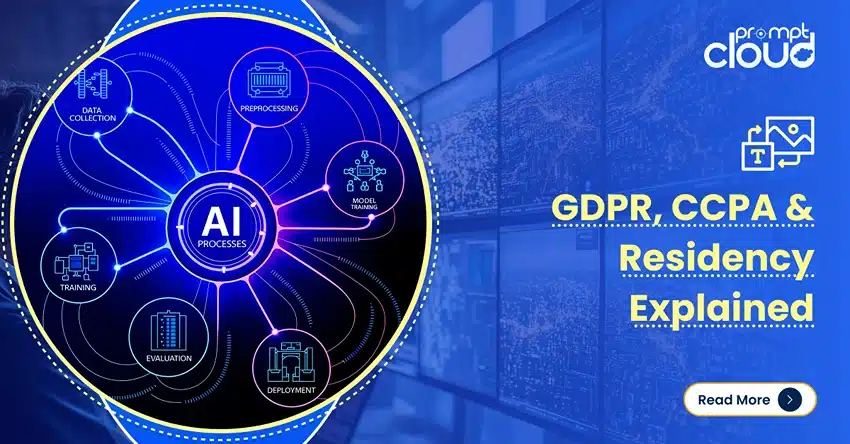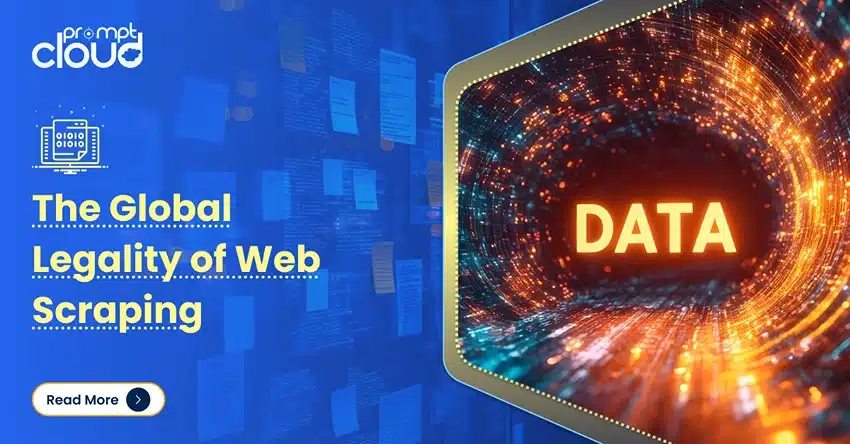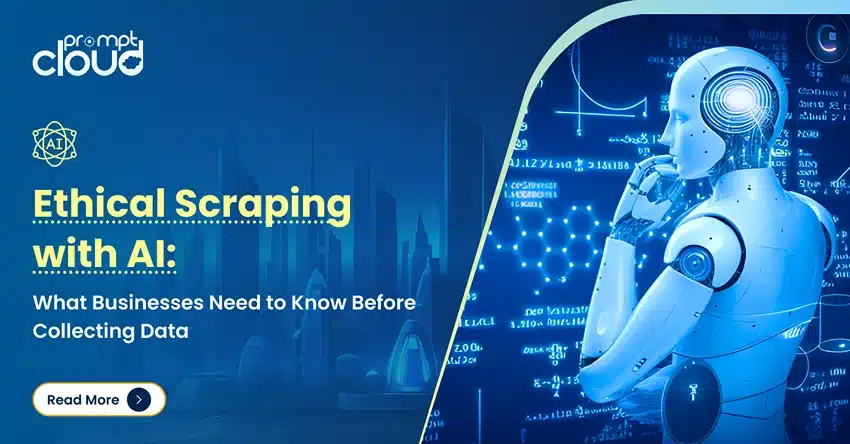
These days, data is pretty much the fuel that keeps most businesses running. Whether you’re a marketer tracking trends, a data analyst training models, or part of a legal team making sure everything’s above board, you already know how valuable the right data can be.
But with great data comes great responsibility, especially when artificial intelligence (AI) gets involved. AI has taken web scraping to a whole new level, helping companies collect data at lightning speed and scale. But just because you can scrape the web with AI doesn’t always mean you should.
That’s where ethical web scraping comes in. In this article, we’ll break down what it really means to collect data the right way, how to stay on the safe side of the law, and why doing it ethically isn’t just a legal checkbox, it’s smart business.
What Is Ethical Web Scraping (And Why Should You Care)?
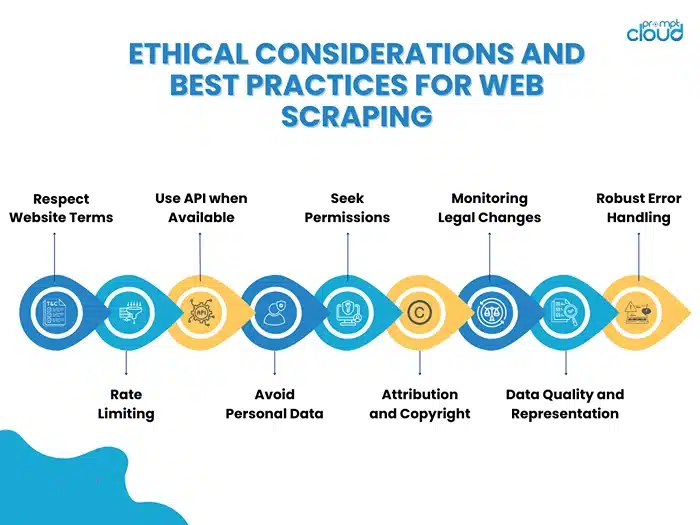
Let’s break this down in simple terms.
Web scraping is when you use software to pull data from websites. Instead of copying and pasting info by hand, scrapers automate the process—perfect for large-scale research or analysis.
Now throw AI into the mix. Instead of just scraping structured data (like a list of product names or job postings), AI can dig deeper. It can understand natural language, analyze images, summarize articles, and even decide what to scrape based on patterns. It’s smart. It’s fast. And it can get out of control if you’re not careful.
That’s where ethical scraping comes in.
Ethical scraping means using these tools responsibly. It means asking not just “Can we collect this data?” but “Should we?” It’s about making sure your scraping practices respect privacy, obey the rules of the site, and don’t exploit personal or sensitive information.
To put it bluntly: just because something is public doesn’t mean it’s fair game. Ethical scraping is about knowing that line—and staying on the right side of it.
Why Businesses Use Web Scraping (And Where AI Changes the Game)
Businesses use scraping all the time. And honestly, it’s super helpful when done right.
Marketers track how competitors are pricing products. Product teams monitor reviews to find out what customers love—or hate. Analysts pull public data from job boards, e-commerce sites, or social media to understand trends.
And now with AI, the process is even more powerful. AI doesn’t just gather the data, it helps make sense of it. It can clean up messy text, summarize articles, and even predict future trends based on what it finds. You can run a single model to gather competitor prices, compare them across categories, and flag where you’re being undercut.
But here’s where things start to blur: AI scraping tools don’t always know when to stop. They don’t always understand privacy. Or context. Or legality.
Example? Say your scraper is crawling LinkedIn for job titles. Seems harmless, right? But now it starts pulling names, emails, and company details—data protected under laws like GDPR or CCPA. Suddenly, a simple project turns into a privacy violation.
That’s the risk. The faster and smarter these tools get, the easier it is to cross ethical or legal lines without even meaning to.
Is Web Scraping Ethical? Well… It Depends
Let’s talk about the big question: is web scraping ethical?
The short answer is: it depends. It’s not black and white. Some scraping is totally fine, some is clearly out of bounds, and a lot sits in the murky gray middle.
Let’s look at a few examples:
1. Scraping public product listings
Say you pull prices from online stores. The data is public, and you’re not collecting anything personal. That’s usually fair game, especially if you’re respecting the site’s rules.
2. Scraping social media posts
Things get fuzzier here. Sure, posts might be public. But they’re tied to real people. Depending on what you do with that data, especially if it includes names or contact info, you could be crossing privacy boundaries.
3. Scraping behind a login wall
If your scraper is logging in to private accounts, that’s a red flag. This could violate the terms of service or even computer fraud laws, depending on your region.
So, no, web scraping isn’t automatically unethical or illegal. But it definitely can be. That’s why having clear guidelines is so important when AI is part of the picture.
The Ethical Considerations When Scraping With AI
When AI is scraping for you, it’s not enough to say, “Well, it’s public.” You need to build in intentional checks and balances. Here are the big things to think about:
1. Data Privacy Isn’t Optional
If your scraper is touching anything that could identify a person, like names, emails, or photos, you have to be extra careful. Privacy laws like GDPR (in Europe) and CCPA (in California) have strict rules. And even beyond legality, people expect companies to treat their data with respect.
2. Be Transparent About What You’re Collecting
This is one of the biggest ethical gray zones. If you’re scraping data to train an AI model or feed into an analytics dashboard, you should be upfront about it. Especially if the data involves user-generated content.
3. Know the Site’s Rules and Follow Them
A lot of websites have a robots.txt file that says, “Hey bots, here’s what you’re allowed to scrape.” Ignoring that is like walking into a building that says “No Entry” and pretending you didn’t see the sign. Not a great look.
4. Don’t Be a Server Hog
AI scrapers can hit sites hard, sometimes sending hundreds of requests a second. That might sound efficient, but it can crash servers or seriously slow them down. Respecting request limits and spacing out calls isn’t just polite—it’s part of being ethical.
5. Keep a Human in the Loop
One of the big dangers of AI scraping is that it can get out of control fast. That’s why it’s critical to have real people reviewing what’s being collected, where it’s coming from, and how it’s being used.
Building an Ethical AI Scraping Strategy for Your Business
Okay, so how do you actually do all this?
It’s one thing to talk about ethical scraping, and another to turn it into an actual strategy. Here’s what that could look like inside your company:
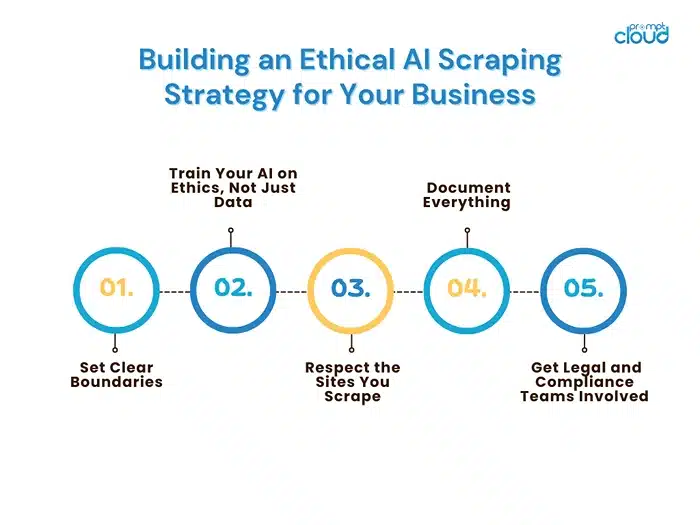
Step 1: Set Clear Boundaries
Before you even start scraping, define what kinds of data are allowed and what’s off-limits. Write it down. Make it part of your data governance or compliance checklist.
Step 2: Train Your AI on Ethics, Not Just Data
Don’t just feed your scraper a list of URLs. Teach it what not to collect, like email addresses, credit card numbers, or anything flagged as personal data. Use regular expressions, classifiers, or filters to catch that stuff early.
Step 3: Respect the Sites You Scrape
Always check for a robots.txt file. If a site says “no bots,” don’t scrape it. Even if the data is juicy. Also, don’t mask your bot’s identity. Use clear headers that say who you are and what you’re doing.
Step 4: Document Everything
Keep logs of what data was scraped, when, and from where. If something goes wrong (or regulators come calling), you’ll want to have a paper trail.
Step 5: Get Legal and Compliance Teams Involved
This is not just a tech project. It’s a business risk. Legal and compliance teams need to be in the loop, especially if your scraping touches regulated industries, user-generated content, or international data.
What Ethical Scraping Looks Like in Real Life
You don’t have to reinvent the wheel. Some companies have already figured out how to scrape ethically, without sacrificing results. Here’s how they’re doing it:
Case 1: The “Clean Scraper” Policy
One B2B SaaS company added an internal approval checklist to every new scraping project. Before anyone runs a bot, they answer:
- What data are we collecting?
- Is it personal?
- Are we following robots.txt?
- Who will use the data and why?
The result? Faster compliance checks and fewer legal headaches.
Case 2: Transparency in Product Training
An AI company scraping customer reviews to improve a chatbot now adds a disclosure note to its site. It tells users what data was used, how it was anonymized, and where it came from. Users appreciate the honesty and trust the product more because of it.
Case 3: Dynamic Throttling
Another team built a scraper that automatically slows down if it detects server lag or errors. This way, they avoid overwhelming small websites and stay in good standing with publishers.
Point is: ethical scraping isn’t just theory, it works in practice. And when you get it right, you build trust with users, avoid messy lawsuits, and keep your data pipeline running smoothly.
Ethical Web Scraping in the Age of AI: What’s Different Now?
We’ve touched on this throughout the article, but it deserves its own spotlight. The reality is this: ethical scraping in 2025 looks very different from what it did even five years ago—and that’s because of AI.
Back then, web scraping was pretty straightforward. You’d write a bot to pull data from a few pages, maybe run a cron job, and call it a day. Now? Scrapers are powered by machine learning models. They can read, understand, and even make decisions based on the data they collect. In many cases, AI is deciding what to scrape, how much, how often, and where to go next, without much human intervention.
And that changes everything.
AI Can’t Be Ethical on Its Own
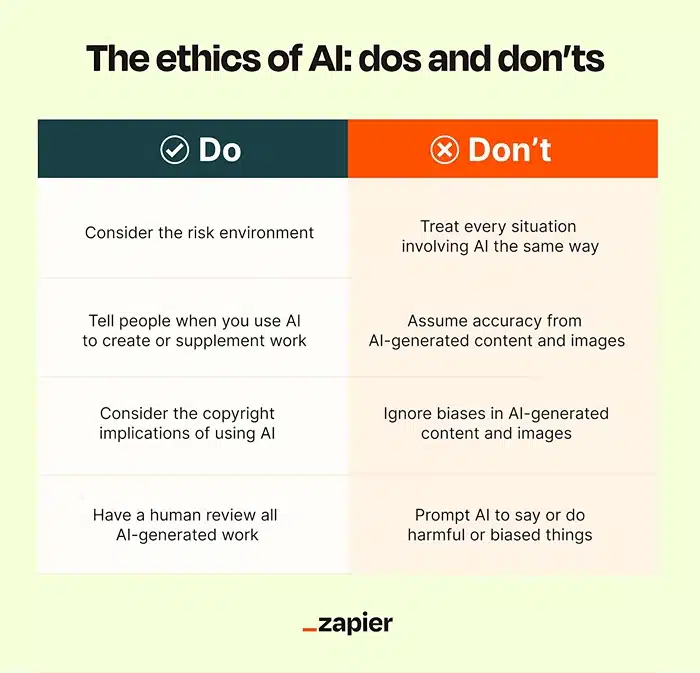
Image Source: Zapier
Let’s be clear: AI doesn’t know what’s ethical. It doesn’t know what a privacy violation looks like, or whether it’s following the rules of a specific site. It just follows the logic it’s been given.
That means the responsibility still lies with your team. You need to teach your AI what’s acceptable, just like you’d train a new employee. You set the boundaries. You build in fail-safes. You make sure someone’s watching what it’s doing.
If you let your AI scraper run wild, pulling anything it finds interesting without any oversight, that’s not smart automation. That’s a lawsuit waiting to happen.
AI Scraping at Scale = Bigger Risks
AI is fast. It can collect more data in one hour than a human team could in a week. But with scale comes risk. If your AI is scraping sensitive data—even unintentionally—you could end up with thousands (or millions) of records you’re not legally allowed to have.
And here’s the kicker: it’s not always obvious. An AI scraping customer testimonials could accidentally grab names or email addresses embedded in comment sections. It might even piece together multiple sources to create a personal profile.
That’s why it’s critical to review what your scraper is doing. Not just once, but regularly.
You’re Training AI on What You Scrape
This is another big shift. Companies aren’t just scraping to analyze—they’re scraping to train. And the data you use to train your models matters.
If your scraping process is flawed—if it includes biased, illegal, or low-quality data—your AI model will reflect that. That’s not just an ethical problem. It’s a product problem.
Ethical web scraping in the AI era means thinking a few steps ahead. Not just “Can we collect this?” but “What happens when we use it to train a model that powers real decisions?”
New Tech, Same Rules (Mostly)
One last point: even though AI has changed how we scrape, the core principles haven’t changed. Laws like GDPR, CCPA, and others still apply. Website terms still matter. And user expectations about privacy are only getting higher.
The difference is that AI makes it easier to cross lines without realizing it. That’s why being intentional—having policies, checklists, and human oversight—is more important than ever.
Scrape Smarter, Not Just Faster
AI is changing how we collect and use data, but that doesn’t mean the old rules don’t apply. In fact, they matter now more than ever.
Ethical web scraping is about being thoughtful. About building systems that are powerful, but also responsible. About recognizing that behind every data point is a person, a company, or a community, and treating them with respect.
So, before you spin up that next scraping tool, take a step back. Ask the right questions. Set the right limits. And most of all, don’t let AI do your thinking for you.
Because in the long run, businesses that scrape ethically don’t just avoid risk, they build stronger brands, smarter products, and deeper trust.Need help creating scraping policies, reviewing your data pipeline, or making your AI models compliant by design? PromptCloud can help you build ethical, scalable, and AI-ready data solutions. Get in touch with our team today!














